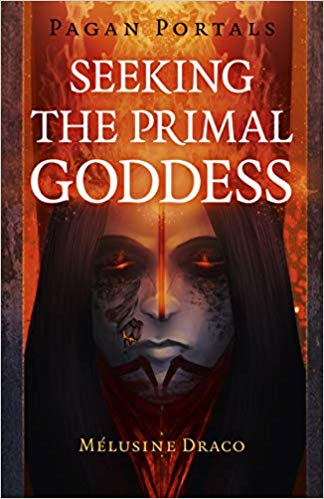It wasn't entirely clear to me where this book was headed. This may be caused by several factors. It's a very short book attempting to find the origins of the primal goddess and where she persists. It assumes a more personal connection to British Traditional Witchcraft, Old Craft and therefore doesn't give enough background for an outsider to follow along. Or it could be as a companion book to another book on Pan/the Horned God, the consort of the Goddess, that half the story is written somewhere else.
Draco begins by discussing classical Greek, Etruscan and Egyptian mythology and paleolithic goddess sculptures. She has some interesting comments on art history with regards to the presentation of the human form in these different ancient cultures. She claims that for a person from a British Traditional background, the ideas of a matrilineal culture promoted by the professor, archeologist and writer, Marija Gimbutas are very appealing. Draco relies heavily on Gimbutas work.
In Draco's British Traditional Witchcraft, the form of the female divine is more ambiguous, less physically defined than in a lot of other pagan paths so the image of the Stargazer, an ancient abstract figure attributed to goddess worship, is something she really relates to. She acknowledges these ideas of a matrilineal culture of the past has come under increasing scrutiny and doubt but the appeal of the idea to her spiritual path remains whether or not the archeologists agree it is true. Her motivation seems to be a desire to connect her spiritual practice to the past and a wish that the archeology and history can support contemporary traditions.
The ancient peoples saw the primal goddess as a fearsome, powerful, creator and destroyer. Draco is compelled to follow the evolution of this awesome, frightening primal goddess and ask whether the modern pagan, be they Wiccan or British Traditional, can relate to and find the path through the myths we know back to this primal goddess. She provides a few exercises to help the reader connect to the primal goddess. She sees something of her own Old Craft in this ancient primal goddess but as a non-initiate, I don't understand it.
With long sections on ancient cultural migrations, English genetics, European archeology and mythology, there's too much ground to cover. I was confused by the long sections on southern European mythology and how these foreign myths relate to the current practitioners of British Old Craft. As an American I was trying to figure out why this matters to the author and to initiates of British Traditional Witchcraft. In her tradition, the male divine, the Owd Lad, is Pan who in their view is also the Horned God. Somehow, the Greek God Pan has migrated to British Traditional Witchcraft.
Draco is interested in the idea of British bloodlines and mitochondrial DNA. Draco considers the idea that maybe some of our ideas are transmitted genetically from the past, and is comfortable with the idea that there is a spiritual connection stemming from one's genetics. For me, this was off-putting. I have no problem with honoring one's ancestors but I am leery of the idea that we inherit complex spiritual thoughts through our DNA. In the Afterthought, Draco suggests that it is more likely that the commonalities from various European myths exist because the stories predate the ancient migrations that separated these cultures rather than because of the existence of a Jungian collective consciousness. Perhaps she could have rewritten her book to adjust to this change of thought.
I suppose at the heart of this particular journey is the ever present question of a tradition's origin. Are British Traditional Witches descended from a very long line going back into the ancient past that through various migrations links these people to the other celebrated mythologies of Europe or are they something very different? Is there a connection between the modern pagan image of Mother Goddess and the awe inspiring Primal Goddess? Is the Owd Lass the modern descendant of the Primal Goddess?
Seeking the Primal Goddess is overambitious. Too many disparate ideas require a lot more fleshing out than is possible in such a short space. The Primal Goddess did not convince me that there is in fact a direct line between the modern British pagan practices and the very ancient past except perhaps in the feeling of affinity the modern pagans have for their ancient ancestors.
This book is written for those familiar with Old Craft and if you aren't familiar with BTW, it will leave you with more questions than answers.
~review by Elsie Smyte
Author: Melusine Draco
Publisher: Moon Books
pp. 96, $10.95
Seeking the Primal Goddess: The Magic and Mystery of the Hearth Fire

©
2010 - 2025
Facing North
